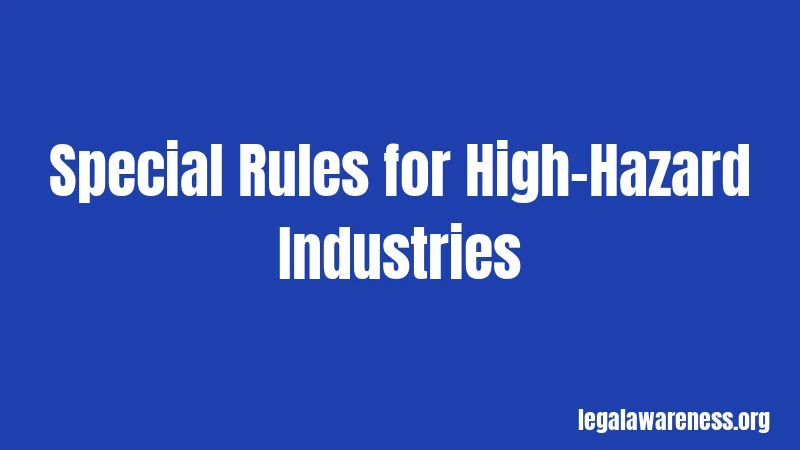OSHA Laws in Texas (2026): What Every Workplace Needs to Know
Most people have no idea Texas follows federal OSHA rules, not its own state program. Seriously. But in Texas, workplace safety laws are strict, and the penalties can hit hard. If you run a business here or work here, understanding these rules matters. Let’s break down exactly what you need to know so you don’t get caught off guard.
The good news? You’re not alone in this. Thousands of Texas employers are navigating these rules right now. Whether you work in construction, manufacturing, healthcare, or agriculture, OSHA standards apply to you. The bad news? Violations can cost you thousands of dollars and create serious problems for your workers.
What Is OSHA?

Okay, let’s start with the basics. OSHA is the Occupational Safety and Health Act of 1970, which requires all private-sector employers to furnish a safe workplace, free of recognized hazards, to their employees. Think of it as the rulebook for keeping workers safe.
OSHA was created for a reason. Before it existed, workplace accidents killed tens of thousands of people every year. Now? That number has dropped dramatically. So even though OSHA rules feel like a burden sometimes, they actually save lives. Pretty straightforward.
Here’s what you need to understand: Texas is not an OSHA-approved State Plan, and is under federal OSHA jurisdiction which covers most private sector workers within the state. This means Texas doesn’t have its own workplace safety agency. Instead, federal OSHA officers enforce all the rules across Texas. Nine regional OSHA offices spread throughout the state handle inspections and complaints.
How Texas OSHA Coverage Works
Not every worker is covered by OSHA in Texas. This part is important. Federal OSHA covers most private sector employees. But here’s the catch: State and local government workers are not covered by federal OSHA. This means city employees, county workers, and state government staff aren’t protected by OSHA.
Wait, it gets more specific. Federal government employees working in Texas? They still follow OSHA rules. So do private sector workers in construction, manufacturing, healthcare, restaurants, retail, and pretty much every other private business.
Wondering if your workplace is covered? If you work for a private business that’s not state or local government, you’re almost certainly covered. It’s that simple.
The Main Rule: The General Duty Clause

Let me explain the foundation of all OSHA law in Texas. It’s called the “General Duty Clause.” Honestly, this is the part most people miss.
Employers must comply with all applicable OSHA standards. They must also comply with the General Duty Clause of the OSH Act, which requires employers to keep their workplace free of serious recognized hazards. In plain English? Your boss has to give you a safe place to work. Not “kind of safe.” Not “pretty safe.” Actually safe.
This clause is huge. Seriously. It means even if there’s no specific OSHA rule covering a hazard, employers still have to protect workers from it. It’s like the safety catch-all rule.
Basic OSHA Requirements in Texas
Keeping Your Workplace Safe
Here’s what employers must do. You need to identify hazards at your workplace. That means walking around and looking for things that could hurt someone. Then you fix those hazards. You can’t just hope nobody gets hurt.
Employers have to provide safety equipment. Helmets, gloves, protective eyewear, respiratory protection—whatever your job needs. Workers can’t be charged for this stuff either. The employer pays.
Your workplace needs to be clean and organized. Hazardous materials need to be labeled clearly. Fire exits need to stay clear. First aid kits need to be available. These seem obvious, right? But you’d be surprised how many workplaces skip these basics.
Reporting and Recording Injuries
Here’s where employers often mess up. Employers with more than 10 employees in higher-hazard industries must maintain OSHA injury and illness records using Form 300. This form tracks every work-related injury and illness.
Why does OSHA care about this? Because the data helps identify which workplaces and industries are most dangerous. OSHA uses this information to target inspections and prevent future injuries.
Certain low-hazard industries are exempt from these recordkeeping requirements. But if you’re in construction, manufacturing, healthcare, or most other fields, you probably have to keep records.
Not sure what counts as a recordable injury? Generally, if an employee gets hurt or sick at work and needs medical treatment beyond basic first aid, it counts. Report it.
Training and Communication
Employers must train workers about hazards. This training needs to happen in a language employees understand. You can’t just hand someone a safety manual and assume they got it.
Training has to cover the specific hazards at your workplace. A warehouse worker needs different training than a healthcare worker. A construction crew needs different training than an office staff.
This training must happen at least once, and employers should refresh it regularly. New employees need training before they start. Workers who change jobs at the same company need new training for their new role.
Special Rules for High-Hazard Industries

Construction
Texas ranks among the top states for construction-related fatalities. No joke. Fall protection, crane safety, electrical hazards, and excavation safety are top priorities for OSHA inspectors.
If you work in construction, you already know this is serious. OSHA enforcement in construction is intense. Most inspections result in violations. Contractors must have safety programs in place before work starts.
Manufacturing and Oil and Gas
These industries get close attention from OSHA. Machine guarding, chemical handling, confined space entry, and lock-out/tag-out procedures are critical. West Texas and the Gulf Coast regions are high-risk areas for oil and gas operations.
Employers must ensure compliance with Hydrogen Sulfide training, fire prevention, and confined space standards. Hydrogen sulfide is especially dangerous in oil and gas work. It can kill you in seconds.
Healthcare Facilities
Here’s where Texas goes beyond basic OSHA rules. Texas Healthcare facilities must comply with Health and Safety Code Chapter 331, which became effective September 1, 2023. This is big. This is different from other states.
Stay with me here. Texas passed a workplace violence prevention law specifically for healthcare. Texas healthcare facilities must adopt workplace violence prevention policies and plans by Sept. 1, 2024. This law applies to hospitals, nursing homes, emergency rooms, surgical centers, and home health agencies.
Why? Because healthcare workers face violence four times more often than other workers. Assault against hospital staff used to be a misdemeanor. Now? Assaulting a hospital worker on hospital property is a third-degree felony. That’s serious prison time.
Healthcare Violence Prevention Committees
Healthcare facilities must establish committees. Each facility shall establish a workplace violence prevention committee or authorize an existing facility committee to develop the workplace violence prevention plan.
The committee must include at least one registered nurse, one physician, and one security employee. They meet regularly to develop and review violence prevention plans. This isn’t optional. Healthcare facilities without these committees are breaking the law.
The plan must address physical security, staff training, reporting systems, and post-incident response. Training must happen at least once a year. Honestly, this law makes sense. Healthcare workers deserve protection.
Agriculture
Farm operations have special rules. Farm labor contractors must be aware of field sanitation, pesticide handling, and heat-related illness protocols. Agricultural work is high-hazard work.
Heat illness is becoming a bigger deal each year. Workers need shade, water, and rest periods. They need to acclimatize if they’re new. OSHA is getting stricter about heat protection.
OSHA Penalties and Consequences
Okay, pause. Read this carefully. Violating OSHA rules is expensive.
Current maximum penalties effective January 15, 2025, include up to $16,100 per violation. But here’s the catch: if OSHA finds you deliberately violated a rule or ignored a known hazard, the fine goes way up. Willful or repeat violations can hit $161,323 per violation.
Think of it this way. A small violation might cost you a few thousand dollars. But a serious violation where someone gets hurt? You could be paying six figures.
Beyond fines, there are other consequences. OSHA can shut down work in an unsafe area. Your safety record becomes public. Workers can sue. Customers might stop doing business with you. Insurance rates go up.
The worst part? If someone dies because of an OSHA violation, criminal charges might follow. We’re talking prison time, not just fines.
Your Rights as a Worker in Texas
You have more power than you might think. Employees have the right to: File a confidential complaint with OSHA to request an inspection of their workplace. Receive information and training about hazards, methods to prevent harm, and the OSHA regulations that apply to their workplace.
You can speak privately with an OSHA inspector. Your employer can’t fire you for reporting safety violations. This is called whistleblower protection.
Want to see your workplace medical records? Receive copies of their workplace medical history. You have this right.
Your employer can’t retaliate against you. No firing, demotion, or reduced hours because you reported a safety problem. If they try? That’s another violation, and you can sue.
How to Comply and Stay Safe
Get a Free Consultation
Here’s something great that most people don’t know about. Texas offers free OSHA compliance help.
The Workers’ Compensation Division’s OSHCON Department provides workplace safety and health consultations to Texas employers, including free OSHA compliance assistance. It’s called OSHCON, which stands for Occupational Safety and Health Consultation.
This service is free. Confidential too. A consultant comes to your workplace and reviews everything. They identify hazards, suggest fixes, and help you understand OSHA rules. They won’t report you to OSHA for violations they find during consultation. This is the place to start if you’re worried about compliance.
You can reach them at 800-252-7031 or visit www.txoshcon.com. Seriously, use this resource.
Create a Safety Program
Don’t just react to problems. Create a safety program before something goes wrong. Your program should include hazard identification, worker training, incident investigation procedures, and corrective actions.
Assign someone to be responsible for safety. This person needs time and resources to do the job right. Safety can’t be a side project.
Regular Inspections
Walk your workplace regularly. Look for hazards. Check that equipment is working properly. Make sure safety gear is available and in good condition. Document what you find and fix issues right away.
This shows OSHA that you take safety seriously. If an inspector visits and finds you’ve been tracking hazards and fixing them, that looks really good.
Train Your Workers
Training is non-negotiable. New hire orientation should cover basic safety. Job-specific training should happen before workers start their job. Refresher training should happen regularly.
Keep records of who was trained, when, and what was covered. This proof is important if OSHA inspects.
Report Incidents Promptly
When someone gets hurt, report it immediately. Don’t wait. Don’t hope it goes away. Report it to the right people and fill out the proper forms.
Keep incident investigation records. Show what went wrong, what caused it, and what you’re doing to prevent it from happening again.
Texas-Specific Workplace Safety Laws
Texas has some additional laws that go beyond federal OSHA.
In Texas the following laws are examples of state-level workplace safety and health laws: Texas Health and Safety Code, Section 81.042 – duty of some employers to report certain communicable diseases to local health authorities or to the Texas Department of State Health Services.
So if an employee gets a communicable disease that might affect the workplace, certain employers have to report it. This became even more important during COVID.
Texas also has strong whistleblower protections. Workers who report safety violations get extra legal protection. Retaliation is taken seriously in Texas courts.
Frequently Asked Questions
Do I have to follow OSHA rules if I work in Texas? If you work for a private business in Texas, yes. Private sector employers must comply with all Federal Occupational Safety and Health Administration (OSHA) regulations across the construction, maritime, agriculture, and general industries. If you work for state or local government, federal OSHA doesn’t apply (though Texas has other safety laws).
What happens if OSHA finds violations at my workplace? OSHA issues citations and fines. You have 15 days to correct the violation. If you don’t, penalties increase. Serious or willful violations carry much larger fines.
Can OSHA show up without warning? Yes. OSHA inspectors can visit your workplace without notice. They can inspect any time during business hours. They have authority to look at records and talk to workers. Denying them entry is illegal.
Do small businesses have the same OSHA requirements? Mostly yes. Some recordkeeping requirements don’t apply to businesses with fewer than 11 employees. But the General Duty Clause applies to everyone. Your workplace still has to be safe.
What should I do if I’m injured at work? Report it to your employer immediately. Seek medical treatment if needed. File a workers’ compensation claim. Keep records of everything. You also have the right to file an OSHA complaint if you believe the employer caused the injury through negligence.
Who can file an OSHA complaint? Any worker, former worker, or someone acting on their behalf can file. It’s confidential. Your name doesn’t have to be disclosed to your employer if you don’t want it to be.
Final Thoughts
OSHA laws in Texas might seem complicated, but the core idea is simple. Employers have to provide safe workplaces. Workers have rights to safety and protection. Everyone benefits when safety is taken seriously.
You now know the basics. Stay informed, stay safe, and when in doubt, reach out to OSHCON for free help. Your workplace safety is too important to guess about.
